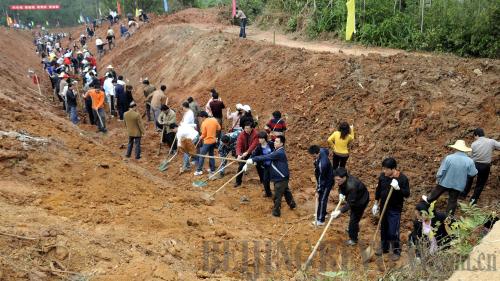|
 |
|
FOR IRRIGATION: Local people in Beihai, Guangxi Zhuang Autonomous Region, build new irrigation facilities on December 8, 2009 (XINHUA) |
Shadow of Bankruptcy
With the fall in the birth rate during the past decades, some colleges in China, particularly those run privately, are on the verge of bankruptcy. While these educational institutions are worried about their future, it is nonetheless a good opportunity to improve China's educational system. Since the 1990s, China's colleges and universities have been allowed to charge tuition fees, which improves their financial situation. But the core of the institution, such as its culture, ethics and fairness, instead of moving forward, is receding.
Today's education centers too much on profit making. In order to make money, some colleges borrow a huge amount of money to build more facilities and try to enroll more students.
Education software should be improved more than anything else. Otherwise, instead of making big money, survival of these colleges will be a problem. Educators need to curb their speculative intentions and be responsible for students, instead of treating them as ATM machines.
Xinmin Evening News
Natural Disasters
Since last autumn, China's southwest region has been plagued by a rarely seen drought, which has seriously affected people's lives. The natural disaster reveals years of insufficient input into irrigation works. Without necessary works, even if current problems are solved, drought will probably attack again. In the 1980s, every farmer was given the task of digging water canals in every village. Years of joint efforts helped to connect canals in villages and reservoirs were always full of water. Reservoirs save water in rainy seasons and supply water in dry seasons. In recent years there has been a great deal of construction of basic agriculture infrastructure, but insufficient investments have been put into building canals and reservoirs. Negligence has led to slurry-filled reservoirs and canals. The severe drought in southwest China is a warning. If we only invest in projects that will bring immediate profit at low costs while paying no attention to public undertakings, such as irrigation works, and delay repairs year after year, droughts and flood disasters are inevitable. Irrigation works might not be as profitable as hydropower stations, but they are the guardian angels of local residents in severe natural conditions and also a precondition for further economic achievement.
Xinmin Evening News
Picky or Frustrated?
In an employment-guidance workshop in late March, an official from the education authority in Hubei Province criticized college graduates for their arrogance about choosing jobs. When security guard positions target graduate students and nightmen target undergraduates, we doubt if it's really graduates' arrogance that results in their unemployment.Generally speaking, people tend to compete for positions offering better welfare and less pressure. Besides, job changing is a freedom of choice and the right of a citizen. Behind the frequent job changing are many unsatisfactory stories about college students' job experiences. When graduates have to compete for a post as a nightman, we can imagine what kind of job opportunities are available for students. Actually, it's not that students are too picky, but that they can't find suitable jobs. The official's complaint is understandable because he cares about the employment rate only. As for welfare and stability of the job and graduates' interest in those positions, none of it relates to officials' political appraisal of performance.
Yanzhao Evening News
Waste Oil
An intensive investigation of more than 4,000 edible oil producers by the Fair Trade Bureau of the Chengdu Municipal Administration for Industry and Commerce in southwest China's Sichuan Province found the products of about 50 of them did not reach national standards, said an official from the bureau on March 29.
He was quoted as saying, "I can responsibly tell everybody that you don't need to worry about oil products sold in Chengdu." The bureau also exposed 13 hot pot restaurants using recycled oil. But we should make it clear the list of the 13 restaurants using the illegal recycled oil was first reported by a local TV station. Under pressure from media and the public, the bureau was pushed on to the front line.
We can understand the official wanted to ease public worries by using the word "responsibly," but he must also "responsibly" take actions to crack down thoroughly on illegal producers. Only in this way, can he really ease the worries of the public.
Chinese Business Morning View
|
